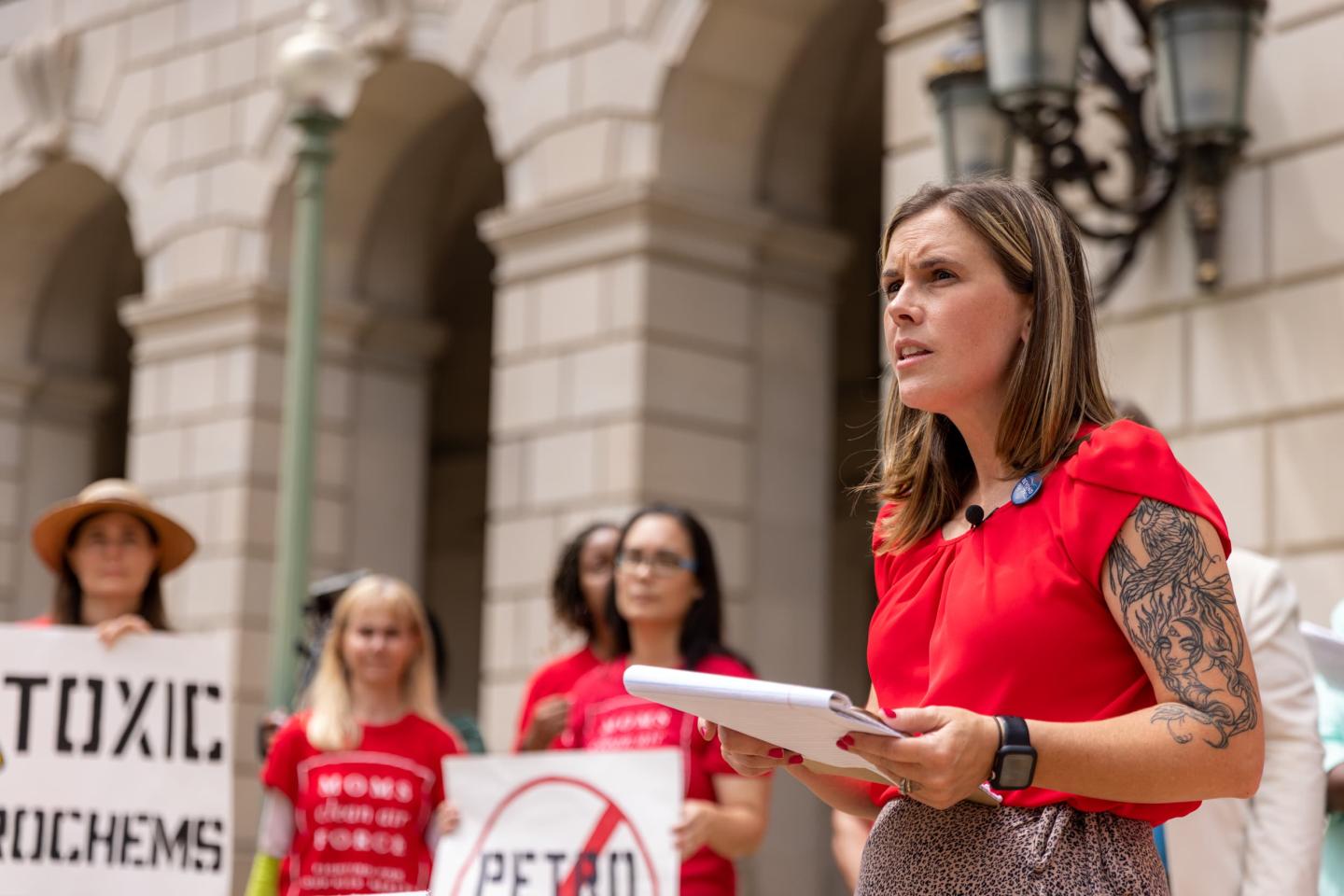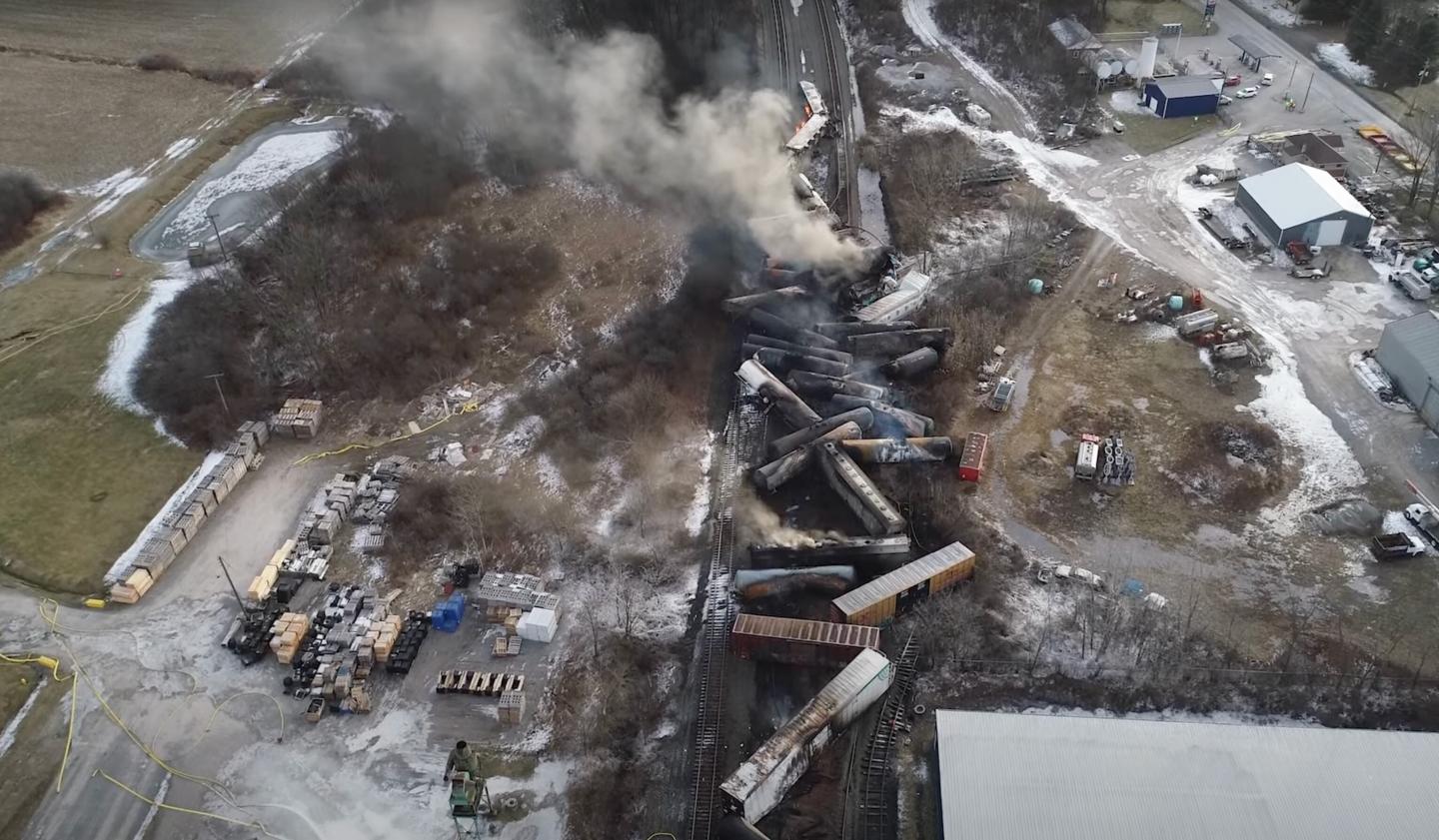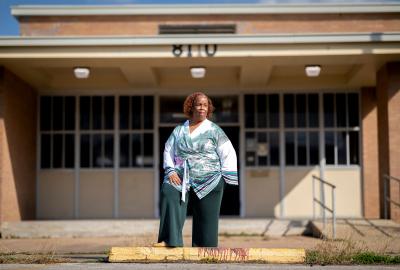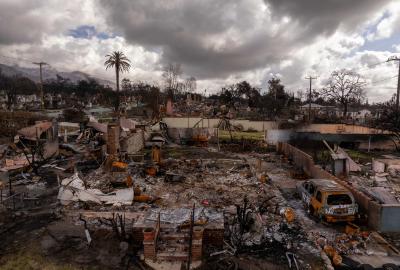Two years after toxic train derailment, many East Palestine residents still fear for their health
On a crisp September morning last fall, Jess Conard watched as her back yard was tested for toxic chemicals.

The results confirmed her fear. A detectable amount of vinyl chloride, a chemical used to make PVC plastic, was still present nearly two years after a headline-making train derailment released the chemical into East Palestine, Ohio.
“When you’re still detecting toxic chemicals in your yard, how do you just move on?” asks Conard. After the derailment upended her small town in 2023, Conard left her job as a speech therapist to advocate full time with the group Beyond Plastics.
In the days after the crash, officials released and burned vinyl chloride from five derailed tank cars. The move was later deemed unnecessary and likely harmful.
“If you burn vinyl chloride, you produce all kinds of poisonous gases, including phosgene, which is very toxic,” says Maria Doa, a chemicals expert at Environmental Defense Fund.
As the train company, Norfolk Southern, continues to clean up the accident site two years later, the community faces a web of interconnected challenges — but the overarching one is anxiety about the long-term effects of vinyl chloride exposure on their health.
“We’re facing impossible choices,” Conard says. “Do we stay in homes we love but don’t fully trust are safe?”
Two years in and more needs to be done
February 3 marks two years since the derailment upended the lives of East Palestine’s 4,700 residents, and the divide between what East Palestine needs and what it is receiving grows starker with each passing month.
Legislation meant to prevent another accident of this kind — the Railway Safety Act — hasn’t gotten through Congress. And lifetime healthcare coverage through Medicare hasn’t been offered to the residents of East Palestine, despite being granted to other communities impacted by environmental disasters.
Although Vice President JD Vance and EPA Administrator Lee Zeldin visited East Palestine on the derailment's second anniversary, funding uncertainty and efforts to shrink the federal workforce under the Trump administration have severely disrupted the agencies responsible for managing environmental disasters.

Then there is the litigation.
Residents near the crash site can receive $25,000 for injuries from Norfolk Southern as a part of a settlement agreement. But the money comes with a caveat — no further financial compensation will be provided should a family member become sick years from now. Vinyl chloride exposure is linked to dizziness and respiratory issues in the short-term, and liver damage and cancer in the long-term, leaving families with an agonizing choice.
Misti Allison’s son was in second grade and her daughter was just a year old when the crash occurred. Her family has opted not to take the money out of fears for their long-term health. As a member of Moms Clean Air Force, Allison has lobbied both state and federal lawmakers to better monitor and care for the health of people living in the town.
“A lot of people are really scared,” Allison says. “You’d like to believe that everything is going to be ok. But there are some people in the area who do still have symptoms, so there’s an undercurrent of unease and fear of unknown.”
Environmental news that matters, straight to your inbox
One possible hope
After the crash, the Environmental Protection Agency designated vinyl chloride a high priority substance to be re-evaluated for safety. On January 15, the agency released a draft scope document, the next step in a detailed process to determine whether the chemical poses an unreasonable risk to human health and the environment.
But any new regulations face an uncertain future given the Trump administration’s pledge to roll back regulations and eliminate as many as 1,000 people at the EPA.
"Mass firings of engineers, scientists and others will weaken EPA and create a dangerous imbalance skewed in favor of polluters over people's health and safety," says Environmental Defense Fund's General Counsel Vickie Patton.
The vinyl chloride on the derailed train was on its way from Texas to New Jersey to be processed into polyvinyl chloride, better known as PVC, a plastic primarily used for pipes and packaging.
Despite its toxicity — which was first recognized more than 50 years ago — production shows no sign of slowing down. And overall petrochemical development is growing both along the Gulf Coast and in the Ohio River Valley, which spans from Pennsylvania to Illinois, as oil and gas companies continue to invest heavily in making plastic.
“What happened in East Palestine isn’t just about one train derailment,” Conard says. “It’s about a system that prioritizes cheap plastic production over community safety.”
More questions than answers
As East Palestine enters its third year after the derailment, there are still more questions than answers.
Will the community receive the long-term healthcare coverage and support it needs? Will any meaningful rail safety legislation pass? Will the EPA’s review of vinyl chloride lead to stricter regulations?
“We’re not asking for anything extraordinary,” Conard says. “We’re asking for what any community deserves: clean air, safe water, healthcare when we’re sick, and the assurance that this won’t happen to anyone else. The solutions are on the table: Medicare for life, rail safety legislation, vinyl chloride regulations. How many more communities need to be sacrificed before we decide that’s worth fighting for?”


